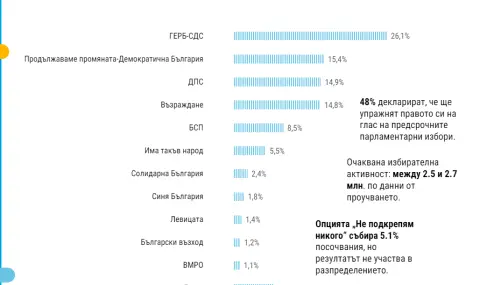The voter turnout in the upcoming parliamentary elections is expected to be around 48% of the adult Bulgarians living in the territory of the country - approximately between 2 and a half million and 2.7 million voters are expected before the polls on June 9. For the European elections, the declared activity is 3% lower.
This is stated in a sociological survey of Trend, realized in the period between May 11 and 18, 2024.
In the first half of the campaign, no structural change was registered in the electoral attitudes of the Bulgarians. GERB has a comfortable lead over the second party with just over 10% of voters. Next is a group of 3 formations that have almost similar results – PP-DB (15.4%), DPS (14.9%) and Vazrazhdane (14.8%).
The order for second, third and fourth place will be decided over the course of the remaining campaign. BSP retained the fifth position with 8.5% of the voters, followed by “There is such a people” with 5.5%.
Below the barrier for parliamentary representation remain Solidar Bulgaria (2.4%), Blue Bulgaria (1.8%), The Left (1.4%), Bulgarian Rise (1.2%) and VMRO (1.1%).
The option “I do not support anyone“ collects a little over 5%, but the result does not participate in the distribution.
There is no serious difference in the preferences of Bulgarians between the elections for the national and European Parliament. A slightly stronger result in the European elections is expected for the PP-DB coalition (16.1%) and Vazrazhdane (15.1%). For the BSP, the result for the Eurolist will be weaker compared to the national vote.
Due to small differences in the percentages of the second, third and fourth in the ranking and due to the possibility of voting in the parliamentary elections in countries outside the European Union, the ranking of the formations in the parliamentary and European elections may be different.
(The study was carried out between 11 and 18 May 2024 through a direct semi-standardized face-to-face interview with a tablet among 1003 people aged 18+. )
